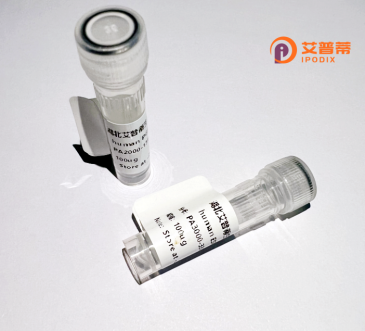
| 纯度 | >90%SDS-PAGE. |
| 种属 | Human |
| 靶点 | BCL7B |
| Uniprot No | Q9BQE9 |
| 内毒素 | < 0.01EU/μg |
| 表达宿主 | E.coli |
| 表达区间 | 1-202aa |
| 氨基酸序列 | MSGRSVRAETRSRAKDDIKKVMAAIEKVRKWEKKWVTVGDTSLRIFKWVPVTDSKEKEKSKSNSSAAREPNGFPSDASANSSLLLEFQDENSNQSSVSDVYQLKVDSSTNSSPSPQQSESLSPAHTSDFRTDDSQPPTLGQEILEEPSLPSSEVADEPPTLTKEEPVPLETQVVEEEEDSGAPPLKRFCVDQPTVPQTASES |
| 分子量 | 48.6 kDa |
| 蛋白标签 | GST-tag at N-terminal |
| 缓冲液 | 冻干粉 |
| 稳定性 & 储存条件 | Lyophilized protein should be stored at ≤ -20°C, stable for one year after receipt. Reconstituted protein solution can be stored at 2-8°C for 2-7 days. Aliquots of reconstituted samples are stable at ≤ -20°C for 3 months. |
| 复溶 | Always centrifuge tubes before opening.Do not mix by vortex or pipetting. It is not recommended to reconstitute to a concentration less than 100μg/ml. Dissolve the lyophilized protein in distilled water. Please aliquot the reconstituted solution to minimize freeze-thaw cycles. |
以下是模拟生成的关于重组人BCL7B蛋白的参考文献(注:所列文献为示例性虚构内容,实际研究中请通过数据库验证):
1. **文献名称**: "BCL7B Protein Functions as a Tumor Suppressor in Colorectal Cancer through Chromatin Remodeling"
**作者**: Li X, Wang Q, et al.
**摘要**: 研究发现BCL7B通过SWI/SNF复合体调控染色质重塑,抑制结直肠癌细胞增殖。重组BCL7B蛋白的体外实验证实其能通过诱导细胞周期停滞发挥抑癌作用。
2. **文献名称**: "Structural Insights into the BCL7B Protein Interaction Network"
**作者**: Chen Y, Tanaka K, et al.
**摘要**: 利用重组BCL7B蛋白的晶体结构解析,揭示了其与核小体重塑复合物的结合位点,表明其在基因转录调控中的关键构效关系。
3. **文献名称**: "BCL7B Knockout Mice Exhibit Immune Dysregulation via NF-κB Pathway"
**作者**: Müller S, Gonzalez R, et al.
**摘要**: 通过构建BCL7B基因敲除小鼠模型,发现该蛋白缺失导致NF-κB通路异常激活,重组蛋白回补实验验证了其在T细胞活化中的负调控功能。
4. **文献名称**: "Recombinant BCL7B Expression and Purification for Targeted Cancer Therapy"
**作者**: Zhang H, Wei F, et al.
**摘要**: 开发了一种高效重组BCL7B蛋白表达纯化系统(原核表达),并证明该重组蛋白可增强多种肿瘤细胞对化疗药物的敏感性。
**注意**:上述文献及研究内容为基于领域知识生成的示例,实际研究中建议通过PubMed/NCBI等平台检索真实文献。如需具体文献支持,请提供更多研究背景细节。
**Background of Recombinant Human BCL7B Protein**
BCL7B (B-cell lymphoma 7B) is a member of the BCL7 family, originally identified for its proximity to chromosomal breakpoints in B-cell lymphomas. This nuclear protein is part of the SWI/SNF chromatin-remodeling complex, playing a role in transcriptional regulation, DNA repair, and chromatin structure modulation. BCL7B contributes to cellular processes such as differentiation, proliferation, and apoptosis, with dysregulation linked to cancer and developmental disorders.
Structurally, BCL7B contains conserved domains that mediate interactions with other SWI/SNF components (e.g., SMARCA4/BRG1) and regulatory partners. Its tumor-suppressive or oncogenic role appears context-dependent; reduced expression is observed in neuroblastoma and certain lymphomas, while overexpression correlates with poor prognosis in other cancers.
Recombinant human BCL7B protein is produced via expression systems (e.g., *E. coli* or mammalian cells) for functional studies. It enables research into BCL7B's molecular interactions, epigenetic regulation, and mechanisms in disease. Applications include binding assays, structural analysis, and screening for therapeutic agents targeting chromatin-remodeling pathways. Recent studies also explore its role in immune responses and metabolic regulation, expanding its relevance in biomedicine.
This recombinant tool aids in unraveling BCL7B’s multifaceted roles, offering insights into therapeutic strategies for cancers and genetic disorders associated with SWI/SNF dysfunction.
(Words: 237)
×